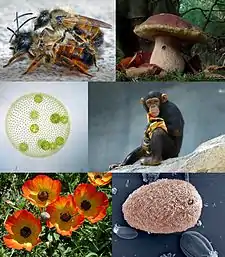Tier
See also: tier
German
| Picture dictionary | |||||||
|---|---|---|---|---|---|---|---|
| |||||||
|
Alternative forms
- Thier (obsolete)
Etymology
From Old High German tior, from Proto-Germanic *deuzą, from Proto-Indo-European *dʰewsóm. Cognate with Danish dyr, Gothic 𐌳𐌹𐌿𐍃 (dius), Old Norse dýr, Swedish djur, English deer.
Pronunciation
- IPA(key): /tiːɐ̯/
audio (file) - Rhymes: -iːɐ̯
Noun
Tier n (genitive Tieres or Tiers, plural Tiere, diminutive Tierchen n or Tierlein n)
- animal (see usage notes below)
- 2010, Der Spiegel, issue 25/2010, page 140:
- Mit seinen 30 Meter Länge und mitunter mehr als 150 Tonnen Gewicht übertrifft der Blauwal jedes andere Tier auf Erden.
- With its length of 30 meters and weight of sometimes more than 150 tons the blue whale surpasses every other animal on Earth.
- Mit seinen 30 Meter Länge und mitunter mehr als 150 Tonnen Gewicht übertrifft der Blauwal jedes andere Tier auf Erden.
- 2010, Der Spiegel, issue 25/2010, page 140:
- A person who has a quality thought of as animalistic, such as ferocity, strength, hairiness, etc.
- Wenn er getrunken hat, wird er zum Tier.
- When he’s had a drink, he turns into an animal.
- (hunting jargon) hind (female red deer)
Usage notes
- Like English “animal”, German Tier has several possible scopes of meaning: Restriction to non-human land mammals is archaic. Restriction to non-human tetrapods is dated. The commonest contemporary use is that including all non-human animals. The inclusion of man is scientific, but also possible otherwise depending on the context.
Declension
Derived terms
- Arbeitstier
- Beutetier
- Faultier
- Getier
- Großtier
- Haustier
- Jagdtier
- Kerbtier
- Kleintier
- Murmeltier
- Nagetier
- Raubtier
- Rentier
- Riesentier
- Rüsseltier
- Schnabeltier
- Wildtier
- Zootier
Related terms
- Tierarzt
- Tierbeute
- Tierfänger
- Tierfell
- Tierfutter
- Tiergarten
- Tierhaltung
- Tierheim
- Tierkäfig
- Tierkunde
- Tiermedizin
- Tiermehl
- Tierpflege
- Tierschutz
- Tierschützer
- Tierspur
- Tierversuch
- Tierzucht
See also
Further reading
- Tier in Duden online
This article is issued from Wiktionary. The text is licensed under Creative Commons - Attribution - Sharealike. Additional terms may apply for the media files.








.jpg.webp)